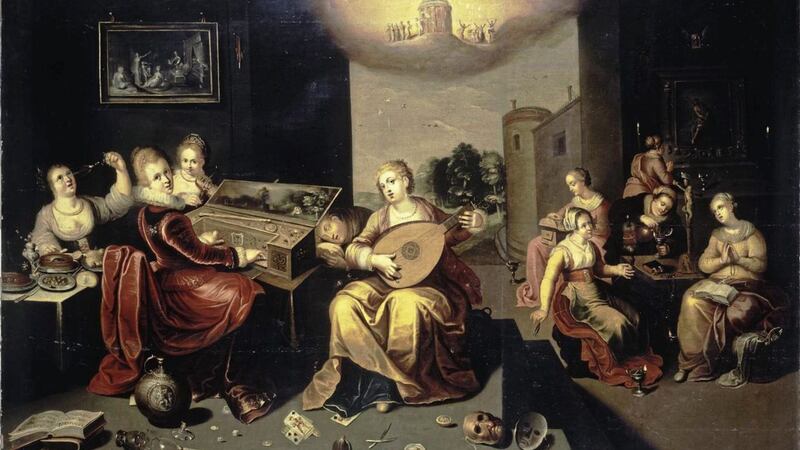ALTHOUGH the parables of Jesus are better known than many other parts of the gospels, they can sometimes be, a bit like riddles, difficult to fathom.
In modern times we have been told sternly by biblical scholars that the parables have only one point to make and that it is wrong to interpret them any other way, and certainly not as allegories.
But one perhaps unorthodox way of approaching them could be to ask with which figure or figures in any particular parable we would like to be identified.
Not that taking this tack, of course, will unlock the full significance of any parable, but it might help to uncover some possible meaning that could otherwise remain elusive.
Take, for example, the case of the parable of the wise and foolish virgins (Matthew 25:1-13), where the choice, in terms of which figure to identify with, would presumably be between either the wise or the foolish virgins.
No doubt most people would spontaneously choose to be thought of as being in the wise rather than the foolish camp.
Who would want to be considered foolish, however defined?
But if one were to look a bit more closely at the parable, an awkward enough problem could arise with too wholehearted a favouring of 'wisdom' over 'foolishness'.
For, according to most people's understanding of Christian values, it is a good thing to love your neighbour as yourself, to care for the weak and to be ready to help those in need.
Yet when we look at the wise virgins, their attitude does seem quite selfish.
They're not willing to share their oil, in case they should ultimately be left at a disadvantage.
They seem only concerned about themselves, and, without taking any personal risk, they fob off their less astute companions by offering them almost cynical advice on how to solve their problem.
Now the evangelist, in recounting this parable, can hardly be wanting to recommend that people become hard and selfish and just look out for their own interests.
So, how else might the parable be interpreted?
Well, it might just be that the more genuine, or at any rate the more human, characters in the parable are not the five wise virgins at all, but the five foolish ones.
The five wise ones end up inside in the wedding hall certainly, while the five foolish ones are left outside, with the door shut on them.
It might just be that the more genuine, or at any rate the more human, characters in the parable are not the five wise virgins at all, but the five foolish ones
But when we ask ourselves which of these two situations corresponds more truly or more realistically to the life we experience on earth, is it not plausible to suggest that the situation of the foolish virgins resembles more closely what people often experience in life?
For in life much remains dark and unfulfilled and often even ends in failure.
And in that sense, human life would appear to have a greater resemblance to a hope for, rather than possession of, happiness.
The possession of happiness is what the wise virgins seem to represent, whereas the hope for happiness is what the foolish virgins would appear to symbolise.
And to that extent, life often seems to bear a greater resemblance to the disappointment of the foolish virgins than to the success of the wise ones.
So, to go back to the original question: 'With whom should we identify ourselves in the parable?'.
Maybe the more honest answer is: 'With the foolish virgins.'
They sought, but because of human weakness failed to find, the happiness they desired.
It is worth noting that even the great mystics speak of achieving union with God - the highest form of happiness imaginable - only for short periods.
It isn't apparently given even to them to prolong that experience indefinitely.
After their ecstasies of union, they find that the grey reality of the everyday world takes over again.
What, on the other hand, does seem to be stubbornly long-lasting is the absence of happiness or the failure to find it, a failure symbolised by the foolish virgins.
And this is a failure that, if we are candid, is perhaps something that will resonate more authentically with us than the success of the wise virgins.
But where, in all these kinds of consideration, is the 'good news' that the gospel seeks to communicate?
The 'good news' lies, I think, simply in the fact that the mystery of divine happiness promised by God doesn't cease to exist simply because we can't grasp it or unravel it conclusively on this earth.
If we could remove the veil that covers the mystery of God in our lives, it wouldn't be a mystery any more, at least not a divine mystery.
The parables speak ultimately about the mystery of God in such a way that they allow us to sense - as in a glass darkly, to use St Paul's terminology - that this mystery exists and has an unbreakable connection with us.
This is the good news that can always outwit and outreach and redeem the frequently bad news of the human condition.
Martin Henry, former lecturer in theology at St Patrick's College, Maynooth, is a priest of the diocese of Down and Connor.








